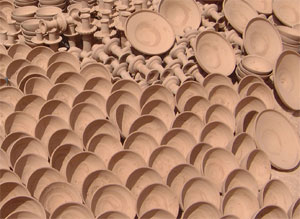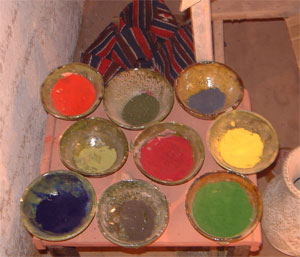Goods
traded between North and South
 The
Caravan routes, linking the Maghreb to the Bilal al Sudan (or Black
country) were established to allow for exchange of goods abundant in
one place, and scarce in the other. The Sudan was in dire need of salt,
while the Maghreb and Europe lacked Gold and cheep labor.
The
Caravan routes, linking the Maghreb to the Bilal al Sudan (or Black
country) were established to allow for exchange of goods abundant in
one place, and scarce in the other. The Sudan was in dire need of salt,
while the Maghreb and Europe lacked Gold and cheep labor.
Along this
'salt for gold' route, sprung numerous desert oasis and communities,
increasing the demand for other goods, such as Moroccan fine crafts
and nutritional treats (grain, dates). The Caravans would load up with
grain in the North and with fine crafts in Fes. They would then trade
in desert posts (Sijilmassa, then further into Mauritania), for salt
and other goods earning a high return in the Sudan. As a passage
oblige on the caravan routes, villages along the Ziz or Draa valley
developed industries of their own to sell to merchants traveling South.
By the
time they reached Timbuktu, the Caravans would have just the necessary
merchandise to trade for a decent load of gold, and buy a few robust
slaves. Occasionally, they also bought a few Ostrich feathers.
 These
'luxury goods' were much lighter than the original load, so caravans
usually traveled with less camels on the way back.This lesser need for
camels was fortunate as caravans usually exhausted their camels on the
way down ( feeding them as little as possible and letting the
animals
rely on their own water supply). Arriving in Timbuktu, the animals would
be exhausted and sold for a marginal price to local herders, who would
then either nurse them back to shape or butcher them for meat.
These
'luxury goods' were much lighter than the original load, so caravans
usually traveled with less camels on the way back.This lesser need for
camels was fortunate as caravans usually exhausted their camels on the
way down ( feeding them as little as possible and letting the
animals
rely on their own water supply). Arriving in Timbuktu, the animals would
be exhausted and sold for a marginal price to local herders, who would
then either nurse them back to shape or butcher them for meat.
Organic
'dies' (Indigo for blue, desert mint for green,
Saffron
for yellow, manganese for black)
Books
were also an unexpected commodity in this trade, as Leo mentions: